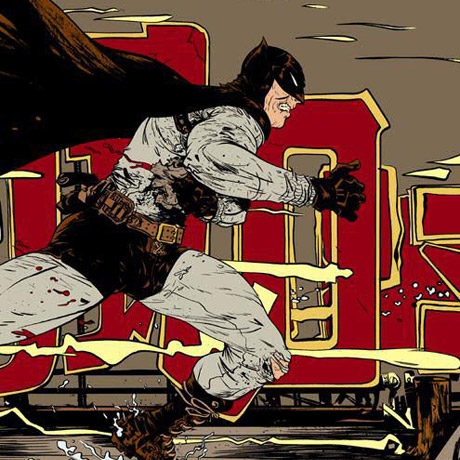    |
|
weblog
February 26, 2006 Paul Pope! Batman! I've finally gotten my hands on the first installment of Paul Pope's Batman Year 100 (sneak peek here, 1.7 MB PDF). It's right down fantastic.  Batman Year 100, Vertigo DC (C) Paul Pope. I must confess being a serious fan of Bob Kane and Bill Finger's caped avenger ever since Frank Miller resurrected him, bleak aura and all. Miller took a figure still bearing the ridicule inflicted by Adam West's infamous TV rendition, and turned it into the dark knight it seemingly yearned to be since the very beginning. Pope takes Miller's lead, then presses fast forward. He sets the pace right on page one, blood-dripping avenger rushing across it, then keeps it humming, his serpentine strokes populating pages with dense depictions of a dystopian world aired through the retinas of police watch-hounds. More to come in March, May, June. Can't wait. Posted by fabio sergio | 12:00 PM | permalink ............ February 22, 2006 February 2004 self-archeology. Two years ago Matt Jones asked me to answer a few questions to (probably) help feed researchers' busy neurons at Nokia. I always love to pretend being a futurist, so I gladly complied. Two years later, while attending Lift06 in Geneva a few weeks ago, I was reminded time and again about my answers. With a few minor edits, to remove obsolete references, here they are. Identify at least three developments in design, technology and/or the human experience of both (trends/weak signals) that you have noticed recently and feel that will be strengthening in 3-5 years time. 1. The desire to buy experiences in time-efficient, "media-like" packages. Whether it is an adventure trip to the Himalayas or an ir-reality show on television, the inability of most people to actually experience "alternative lives", coupled with the ever-increasing exposure to disparate lifestyles, makes for a desire to squeeze such experiences into interstitial timeframes of varying length (micro to macro and back). We crave even what we realize we cannot fully live through, and we are willing to accept a diluted version of it, just as long as it meets our media-driven perceptions of it. Key for the commercial success of similar propositions will thus be the freedom for people to control tune-in/tune-out times, adapting them to shifting time availability. A fully scalable experience economy. 2. The active, direct involvement of "the people formerly know as users/consumers" in the development process of products and services. Phenomena such as the Free Software/Open Source movement are showing new ways in which products and services can be made better, or even fully developed by the very users of such products and services. While it is inherently more difficult to migrate such a model to atom-based artifacts, many companies are already setting up processes that involve users as co-designers of their products. This scenario on one side potentially creates new conflicts related to branding "ownership" and control, but also increases opportunities for an adaptive product development process to be established, where consumers are provided with a framework around which they are free to build their own configurations. 3. The shift from personal computing to social computing and its economical and political implications. Connectivity, in all of its wired and wireless embodiments, is showing that at the bottom of most any technology-driven value chain lays human-to-human contact. While economical implications are already starting to become evident, this lesson is even more relevant when it comes to themes such as emergent democracy, or the ever-increasing influence of e-opinions. How this might affect equilibriums in developing countries also remains to be seen. Can digital channels ultimately affect the very concept of freedom? Make your prophecy; list some emerging technologies or trends that would affect our lives and work in revolutionary ways (either next year or next decade)? 1. Control vs. privacy. The fear and instability recently caused by terrorism has created an unbalance between the desire to feel safe and the inherent dangers of a policed state. While this sort of consideration appears to be mainly affecting the US, similarly different trends are actually popping up in other disguises elsewhere. How will the ability to track people’s movements and habits, whether for legal or purely commercial reasons impact people’s lives? How much will we be collectively willing to give up in terms of privacy, and in exchange for what? Will that information be sold by its very producers? 2. Life-streaming/capturing technologies. Apparently contradicting the former point people seem increasingly obsessed with the ability to capture and keep track all they experience, often making it available to the public. From weblogs to moblogs to Tivos the availability of cheap mass-storage devices to be filled with text, pictures, videos and audios is changing the way we relate to reality and memory. Are we nearing a time when people will not be able to forget? Which are the top 3 disciplines that will have a major societal impact over the next 5-10 years? Religion. Network theory. Genetic engineering. What has irritated you most today/this morning? Having to drive trough a blizzard for 40 minutes to cover 5 miles, just to reach a room where there’s a cable to connect to The Network. We do not expect to buy homes without running water, and we do not expect water to be expensive, because without water we could not survive. Water is for all purposes a commodity, but the economic implications of having running water in each home go well beyond its sheer availability. Without water we could not cook, thus it would be pointless to buy food, appliances and tools to prepare it; without water we could not clean, bodies, clothes and all other home objects, thus it would be useless to buy soap, detergents, dishwaters, showers, faucets. Enough examples. Water acts, for all purposes, as an economic enabler. I think the ability to connect to The Network should be seen in the same light. What has delighted you recently? Dinner with Valeria, my wife, celebrating 3 years since the day that first brought us together, in the same restaurant where we had lunch with families and friends after our wedding.?Love. A sense of belonging. Rituality. Posted by fabio sergio | 11:21 PM | permalink ............ February 19, 2006 Resurfacing, sort of (a slight reprise). What do you do when you've neglected a group of friends on and off for... er... a couple of years? Play stupid, show up on their doorsteps unannounced and pretend nothing happened? Play apologetic and spend hours trying to explain that you were indeed participating in your own personal episode of Lost, or that you were too busy, lacking inspiration and energy, or that the real reason you've gone amiss is, well, whatever other lame excuse you've managed to come up with? Will you play amnesiac, and pretend that you've just remembered that you indeed knew those people in the first place? Or will you just play crazy hoping that pity will obfuscate judgement and mitigate disdain? I plan on playing stupid, just so that you know. Along these lines it's also pretty pointless to even try and attempt catch-up in one go. I'll let the news trickle down, droplets rather than downpour. So here's the first not-so-new novelty: I'm no longer working for 3G mobile carrier Three, and have joined the remaining contingent of Interaction Design Institute Ivrea. No, what you might have heard is not true, IDII is still alive and well, albeit relocated under Domus Academy's roof in Milano. Under the careful eyes of Heather Martin and Neil Churcher last year's first-year now-second-year students (say that three times fast) are now working hard on their thesis, and will be completing their two-year masters course this June. I am honored and humbled to be part of the (original) family. If you care to keep updated with what we're are up to all you need to do is to visit IDII in Milano and/or subscribe to its handy RSS feed. Hmmm. That's all for now I guess. Transmissions will irregularly resume. Posted by fabio sergio | 12:35 PM | permalink ............ Not bored yet? Visit freegorifero's weblog archives for more useless words. |
updated with blogger |
|
| © freegorifero.com This web site is licensed under a Creative Commons License. Some rights reserved. |
|